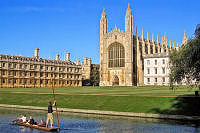Rusticate
If this reminds you of rustic, you’re on the right lines. When it first appeared, around 1660, it meant to live in the countryside, or to move to the country to experience a quiet rural life. To get away from it all, as we would say today. That sense is now rather dated, particularly in Britain, though my unscientific impression is that it survives in the USA, mainly in writing:
August is traditionally the slowest month of the season, the time to rusticate in the Hamptons, the Catskills, the South of France or Litchfield County.
The New York Observer, 11 Aug. 2003.
Sometimes, the implication is derogatory:
If the RHS [Royal Horticultural Society] did not already own Wisley, there would be no conceivable reason to rusticate a library of the Lindley’s status to this inaccessible spot.
The Independent, 11 Jan. 1995.
It can also be used of a building technique in which masonry is marked with sunk joints and a roughened surface to imitate a rustic appearance.

It’s possible to be rusticated from here
From the early eighteenth century, a distinctive sense grew up in the ancient British universities of Oxford and Cambridge. A student (I beg his pardon, an undergraduate) who had committed an offence was sent down for a while — rusticated — as a punishment. Americans are hardly aware of this meaning, I believe. In countries such as India and Pakistan the sense has widened to mean any temporary suspension of a person from their duties — I’ve found it used of football players, judges and junior doctors as well as of students.
The source is the classical Latin verb “rusticārī”, which variously meant to live or stay in the country, to work in the country or to practise farming. Rustic is from the adjective rūsticus. Both it and rusticate ultimately derive from rūs, the country. (It looks as though this might be the source of Russia but it isn’t.)

